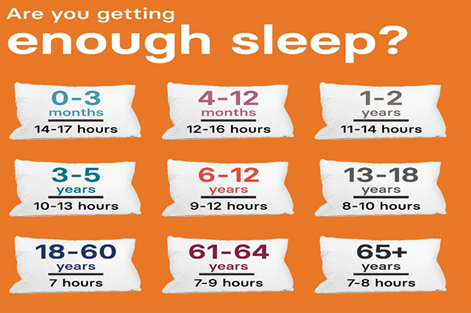
Constitution Of Human Body Based On Ayurvedic Science :
According to Ayurveda, whatever exists in the cosmos is present in our bodies via three bio-energies known as Vata, Pitta, and Kapha. Every human organism contains Tridosha, which oversees the basic vital functions. In this way, their equilibrium condition promotes our total well-being, but their out-of-equilibrium state eventually leads to our bodily, mental, and social illness. Balancing the Tridosha is realistically feasible through the diet we consume and the everyday behaviours we practise based on contemporary science, such as consuming enough levels of macro and micro nutrients.
Calorie based eating habits:
How many calorie do we need for a day?
As a guide: an average man needs 2,500kcal a day. An average woman needs 2,000kcal a day.
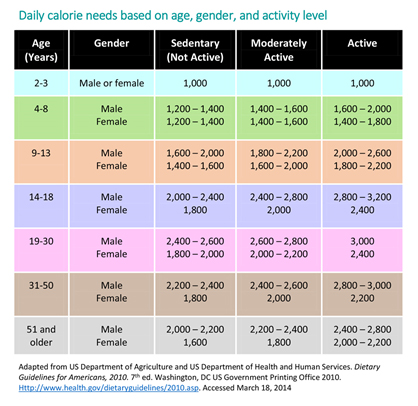
Calorie Based On The Common Indian Diet:
Food |
Amount |
Calories per serving |
Bottle gourd |
100 gm |
11 |
Ridge gourd |
100 gm |
13 |
Bitter gourd |
100 gm |
21 |
Capsicum |
100 gm |
16 |
Fenugreek leaves (cooked) |
100 gm |
34 |
Radish leaves |
100 gm |
26 |
Spinach |
100 gm |
24 |
Pumpkin |
100 gm |
23 |
Zucchini |
100 gm |
20 |
Drumsticks |
100 gm |
67 |
Tomato |
100 gm |
21 |
Sprouts |
100 gm |
44 |
French beans |
100 gm |
24 |
Kidney beans |
1 cup |
337 |
Soya beans |
1 cup |
446 |
Beans |
1 cup |
40 |
Peas |
1 cup |
118 |
Lady’s finger |
1 cup |
150 |
Cabbage |
1 cup |
60 |
Cauliflower |
1 cup |
150 |
Broccoli |
1 cup |
40 |
Brinjal |
1 cup |
40 |
Cottage cheese |
100 gm |
258 |
Palak paneer |
1 cup |
280 |
Fried potato |
1 cup |
200 |
Mashed potatoes |
1 cup |
100 |
Sweet potato |
1 cup |
96 |
Mushrooms |
1 cup |
296 |
Mixed Veggies |
1 cup |
80 |
Vegetable Curry |
1 cup |
130 |
Fruits |
quantity |
Calories |
Small guava |
1 |
32 |
Small orange |
1 |
37 |
Small pear |
1 |
37 |
Small mango |
1 |
42 |
Small apple |
1 |
62 |
Small peach |
1 |
40 |
Sweet lime |
1 |
27 |
Banana |
1 |
110 |
Watermelon |
few slices |
20 |
Litchis |
few slices |
53 |
Melon |
1 bowl |
23 |
Strawberries |
1 bowl |
25 |
Pomegranate |
1 bowl |
55 |
Cherries |
1 bowl |
60 |
Grapes |
1 bowl |
60 |
Bread |
Count |
Calories per serving |
Bread |
1 |
45 |
Small poori |
1 |
75 |
Roti |
1 |
100 |
Parantha |
1 |
150 |
Aloo parantha |
1 |
170 |
Pav |
1 |
180 |
Naan |
1 |
262 |
Butter Naan |
1 |
310 |
Food Item |
Quantity |
Calories |
Papad |
1 |
45 |
Idli |
1 |
100 |
Plain dosa |
1 |
120 |
Masala dosa |
1 |
250 |
Vermicelli |
100 gm |
333 |
Ragi |
100 gm |
320 |
Quinoa |
100 gm |
328 |
Tofu |
100 gm |
76 |
Raita |
1 serving |
20 |
Sugar |
1 spoon |
30 |
Pickles |
1 spoon |
30 |
Salad |
1 plate |
100 |
Vegetable Rice |
1 plate |
200 |
Boiled Rice |
1 cup |
120 |
Fried Rice |
1 cup |
150 |
Cereal or oats with milk |
1 cup |
150 |
Sambar |
1 cup |
150 |
Curd |
1 cup |
100 |
Any lentils or dhal |
1 cup |
150 |
|
|
|
Beverage |
Quantity |
Calories per serving |
Water |
1 glass |
0 |
Green tea |
1 cup |
10 |
Black tea |
1 cup |
10 |
Milk Tea |
1 cup |
45 |
Cappuccino |
1 cup |
45 |
Plain milk |
1 cup |
60 |
Milk with added flavours |
1 cup |
120 |
Fruit juice |
1 cup |
120 |
Tender coconut |
1 cup |
15 |
Soup |
1 bowl |
75 |
Soda |
1 bottle |
10 |
Cold drink |
1 bottle |
90 |
Milkshake |
1 bottle |
200 |
Beer |
1 bottle |
200 |
Alcohol |
1 serving |
75 |
Food Item |
Quantity |
Total Calories |
Coconut |
100g |
409 |
Fried Nuts |
1 cup |
450 |
Peanut |
500g |
520 |
Flax seed |
500g |
534 |
Pistachio |
100g |
539 |
Cashewnut |
100g |
582 |
Almond |
100g |
602 |
Pakodas |
50g |
175 |
Vada |
1 |
70 |
Samosa |
1 |
140 |
Sandwich |
1 |
250 |
Burger |
1 |
250 |
Biscuit |
1 |
30 |
Chips |
1 packet |
120 |
French Fries |
1 serving |
427 |
Bhel or Pani puri |
1 serving |
150 |
Pav Bhaji |
1 plate |
610 |
Indian sweets |
1 piece |
150 |
Pudding |
1 cup |
200 |
Jam |
1 spoon |
30 |
Falooda |
1 glass |
300 |
Food Item |
Quantity |
Total Calories |
Cream |
50g |
105 |
Cheese |
50g |
155 |
Butter |
1 tablespoon |
45 |
Ghee |
1 tablespoon |
45 |
Whole milk |
1 cup |
150 |
Egg |
1 |
75 |
Boiled egg |
1 |
80 |
Scrambled egg |
1 |
80 |
Fried egg |
1 |
110 |
Omelette |
1 |
120 |
Meat |
1 plate |
450 |
Mutton biryani |
1 cup |
225 |
Fried chicken |
1 serving |
200 |
Chicken curry |
1 serving |
225 |
Tandoori Chicken |
1 serving |
260 |
Butter chicken |
1 serving |
490 |
Chicken tikka masala |
1 serving |
457 |
Fried fish |
1 serving |
140 |
Salmon |
100g |
172 |
Pomfret |
100g |
123 |
Squid |
100g |
80 |
Crab |
100g |
81 |
Prawn |
100g |
65 |
Cooked chicken |
100g |
200 |
Cooked pork |
100g |
230 |
RDA Of Micronutrients:
Water soluble vitamins:
Nutrient |
Sources |
RDA or AI (adults > 19 years) |
Vitamin B1 (thiamine) |
Whole grains, meat, fish |
1.1-1.2 mg |
Vitamin B2 (riboflavin) |
Organ meats, eggs, milk |
1.1-1.3 mg |
Vitamin B3 (niacin) |
Meat, salmon, leafy greens, beans |
14-16 mg |
Vitamin B5 (pantothenic acid) |
Organ meats, mushrooms, tuna, avocado |
5 mg |
Vitamin B6 (pyroxidine) |
Fish, milk, carrots, potatoes |
1.3-1.7 mg |
Vitamin B7 (biotin) |
Eggs, almonds, spinach, sweet potatoes |
30 mcg |
Vitamin B9 (folate) |
Beef, liver, black-eyed peas, spinach, asparagus |
400 mcg |
Vitamin B12 (cobalamin) |
Clams, fish, meat |
2.4 mcg |
Vitamin C (ascorbic acid) |
Citrus fruits, bell peppers, Brussels sprouts |
75-90 mg |
Fat Soluble vitamins:
Nutrient |
Sources |
RDA or AI (adults > 19 years) |
Vitamin A |
Retinol (liver, dairy, fish), carotenoids (sweet potatoes, carrots, spinach) |
700-900 mcg |
Vitamin D |
Sunlight, fish oil, milk |
15-20 mcg |
Vitamin E |
Sunflower seeds, wheat germ, almonds |
15 mg |
Vitamin K |
Leafy greens, soybeans, pumpkin |
90-120 mcg |
Macro minerals:
Nutrient |
Sources |
RDA or AI (adults > 19 years) |
Calcium |
Milk products, leafy greens, broccoli |
1000-1200 mg |
Phosphorus |
Salmon, yogurt, turkey |
700 mg |
Magnesium |
Almonds, cashews, black beans |
310-420 mg |
Sodium |
Salt, processed foods, canned soup |
1500 mg |
Chloride |
Seaweed, salt, celery |
1800-2300 mg |
Potassium |
Lentils, acorn squash, bananas |
2600-3400 mg |
Sulfur |
Garlic, onions, Brussels sprouts, eggs, mineral water |
None established |
Trace minerals:
Nutrient |
Sources |
RDA or AI (adults > 19 years) |
Iron |
Oysters, white beans, spinach |
8-18 mg |
Manganese |
Pineapple, pecans, peanuts |
1.8-2.3 mg |
Copper |
Liver, crabs, cashews |
900 mcg |
Zinc |
Oysters, crab, chickpeas |
8-11 mg |
Iodine |
Seaweed, cod, yogurt |
150 mcg |
Fluoride |
Fruit juice, water, crab |
3-4 mg |
Selenium |
Brazil nuts, sardines, ham |
55 mcg |
BMI Chart:
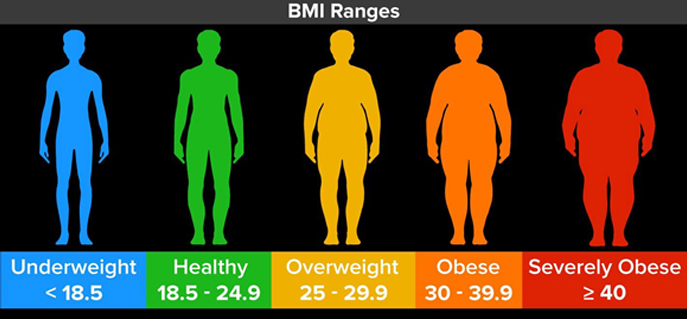
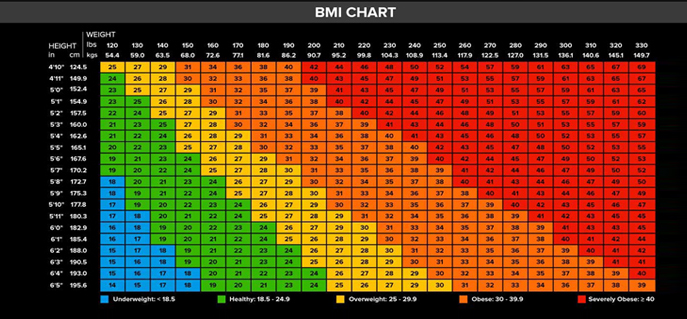
Sleep
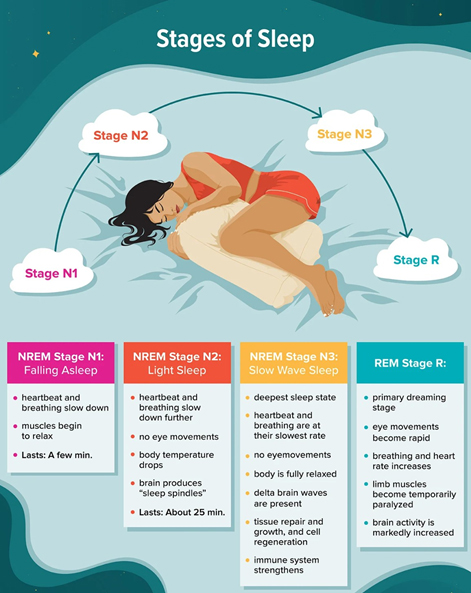
Importance of Sleep:
- Sleeping for less than 6 hours a day and still having sufficient energy to perform day-to-day activities is not something to brag about. Just like food, water, and oxygen, sleep too plays a very important role in the existence of life. Lack of sleep is associated with cardiac problems, obesity, and even early death.
- Research shows that most people need at least 7 to 8 hours of sleep to function optimally.
- Sleeping less and being awake for several hours during the day is not a testament to your physical strength and endurance but a silent indication that your health is deteriorating.
- Lack of sleep disrupts the hormone levels, which lead to a considerable increase in the person’s appetite, making him or her feel hungry even when the body doesn’t need food.
- Adequate sleep is an essential part of a healthy lifestyle and can have a positive impact on the lungs, kidneys, metabolism, and weight control.
- If you’re chronically sleep-deprived, it can also affect your immune function, disease resistance, sensitivity to pain, mood, and brain function.
- Recent studies have revealed that too much and too little sleep increase the risk of premature death. Low levels of immunity triggered by lack of sleep slow down the body’s natural defences against microorganisms, thus increasing the risk of contracting various infections.
- It also predisposes a person to developing serious illnesses in the long run, like diabetes, heart disease, colorectal polyps, and even cancer.
- Sleep is also considered to be a natural stress reliever. Reduced stress levels help keep the blood pressure under control.
- Lack of sleep leads to vision-related issues. The longer you are awake, the more visual errors you’ll encounter, and the more likely you are to experience tunnel vision, double vision, and dimness.
- Each one of us feels fatigued, irritated, disoriented, and distracted after an occasional sleepless night, but if this habit persists for a long time, it can impact brain functioning to a large extent.
- Your brain will fog, which in turn will hinder your confidence levels and decision-making ability. You may even feel lethargic and sleepy during the day, which could also make you accident-prone at home, work, or on the road.
- Given that a single sleepless night can have such drastic repercussions the following day, you can only imagine what continued sleep loss could do to your mind and body. Experts believe it could lead to memory loss as well as long-term mood disorders like anxiety and depression.
- Regular sleep disruptions are also linked to infertility in both men and women. Apparently, if you don’t allow the body to rest in sleep mode, the secretion of reproductive hormones is reduced, thus causing problems in pregnancy.
- If you sleep less than 8 hours a day, make the necessary changes in your lifestyle before it is too late.
